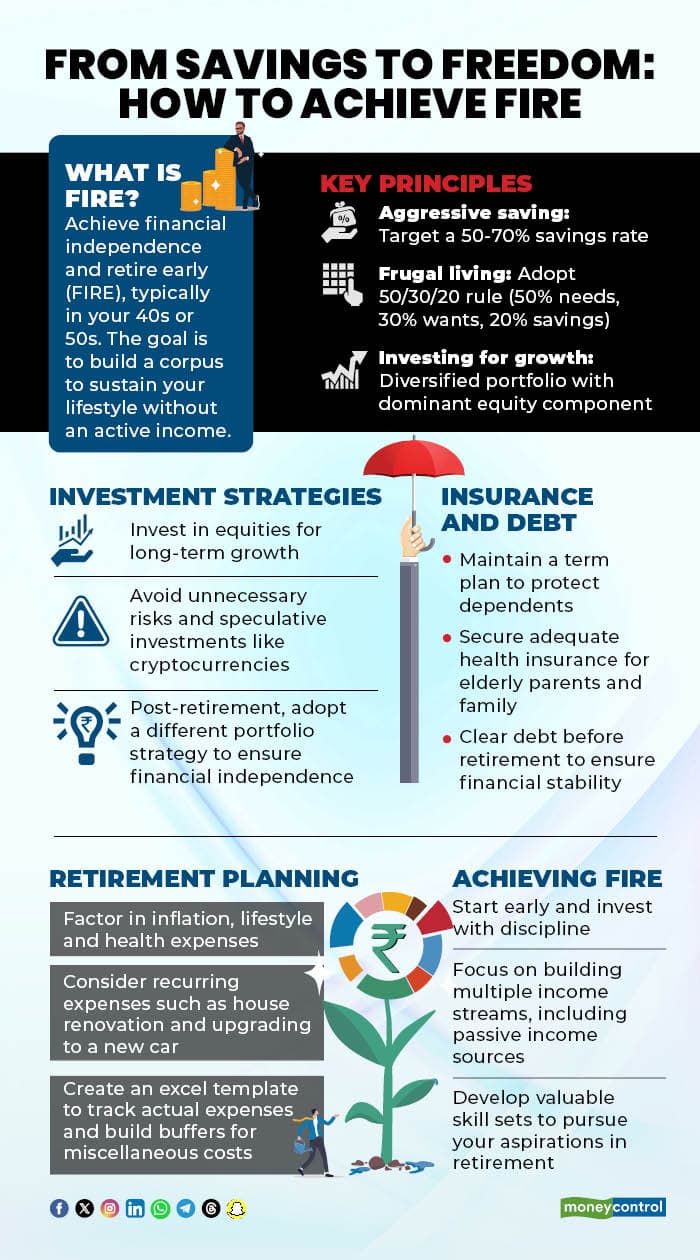



In an era of rising living costs, job uncertainties and the allure of a stress-free life, the FIRE or financial independence, retire early movement has gained traction among young professionals. FIRE involves aggressive saving and investing to build a corpus that allows retirement in one's 40s or 50s, rather than the traditional 60s. In India, with inflation hovering around 6-7 percent annually and volatile markets, achieving FIRE requires tailored strategies.
Also, factors like family obligations including possible high-value loans for childrens' education and urban expenses make it challenging yet attainable.
Calculate your FIRE numberThe foundation of FIRE is determining your "FIRE number"—the corpus needed to sustain your lifestyle without active income.
Higher inflation and market risks in India advocate a safe withdrawal rate (SWR) post-retirement of around 3-3.5%. This means that if you have a retirement corpus of Rs 1 crore, you can safely withdraw Rs 3-3.5 lakh per year without depleting the corpus too quickly.
Before that, though, you need to audit your finances. Calculate your net worth: assets (savings, investments, property) minus liabilities (loans, credit card debt). Track monthly income and expenses using Excel or budgeting apps.
Start earlyFIRE demands frugality. Target a 50-70 percent savings rate by minimising wants. Adopt the 50/30/20 rule but tweak it: 50 percent needs, 30 percent wants, 20 percent savings—then push savings higher by cutting spending on luxuries, or non-essentials.
To achieve financial freedom, it's essential to start early and invest with discipline, allowing your money sufficient time to grow and compound. Consistent investing and reinvesting of returns can help harness the power of compounding, generating substantial wealth over time. This approach enables your investments to snowball, creating a sizeable corpus that can support your long-term financial goals.
Also read | No-cost EMI: A convenient option or a costly affair?Factor in inflation, lifestyle, health expensesCalculating the required retirement corpus involves considering various factors, including inflation, healthcare costs, education and marriage expenses for children, maintaining one's lifestyle, vacations and life expectancy. Additionally, expenses like house renovation and upgrading to a new car that are not one-time items should also be factored in to ensure a comprehensive retirement plan.

To estimate your retirement corpus accurately, create a spreadsheet template to track actual expenses, including rent, medical costs, insurance premiums, groceries, utility bills, entertainment and taxes. Analyse past expenses to get a realistic picture, and build in buffers for miscellaneous costs. Then, assess and take into consideration which expenses will change upon retirement, whether higher or lower.
Also read | SIP is the way for Indian youth to gain financial freedomInvest wisely for growthKeeping your savings locked up in bank fixed deposits won't beat inflation. Instead, invest in a diversified portfolio. For a retirement corpus, consider investing in equities for the long term to reach your target, and to account for a long lifespan. However, avoid unnecessary risks and speculative investments like cryptocurrencies. Post-retirement, keep the corpus separate and adopt a different portfolio strategy for any sums left over to ensure financial independence. A balanced approach can help mitigate risks and optimise returns.
Continue with your insurance plansAfter retiring early, it's crucial to maintain a term plan to protect dependents, providing a safety net at an affordable cost. If you have outstanding loans, continue term insurance to cover liabilities. Additionally, secure adequate health insurance for elderly parents and a floater plan for your family, factoring insurance premiums into your retirement corpus calculations.
Also read | Domestic mutual fund schemes that can give you indirect access to global marketsClear outstanding debtIn the post-retirement phase, individuals face the challenge of managing expenses without a regular income. To ensure financial stability, it's essential to clear all loans and liabilities before retirement, as paying EMIs from the corpus can be difficult and unsustainable. By eliminating debt, retirees can better handle their expenses and make the most of their retirement savings, reducing financial stress and allowing for a more comfortable post-work life. This proactive approach helps safeguard their financial independence.
Advice for people planning to retire earlyEarly retirement requires not only a solid financial plan but also a clear understanding of your aspirations. It's essential to have a plan in place to pursue your goals and dreams. To ensure a smooth transition, focus on building multiple income streams, including passive income sources, by developing valuable skill sets. This approach will provide financial support and freedom to pursue your aspirations in retirement.
Discover the latest Business News, Sensex, and Nifty updates. Obtain Personal Finance insights, tax queries, and expert opinions on Moneycontrol or download the Moneycontrol App to stay updated!
Find the best of Al News in one place, specially curated for you every weekend.
Stay on top of the latest tech trends and biggest startup news.